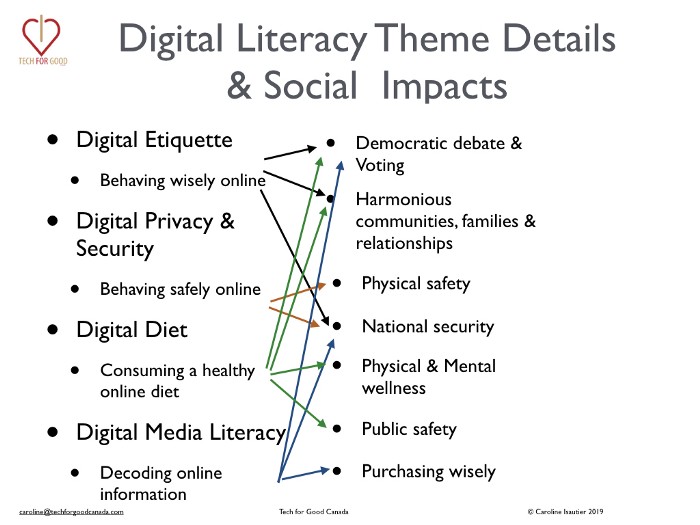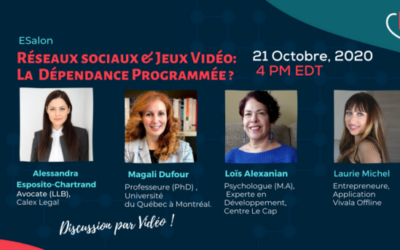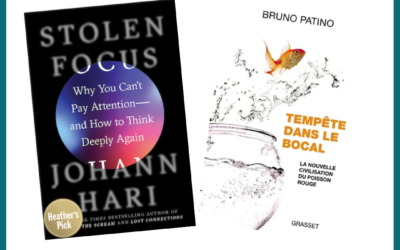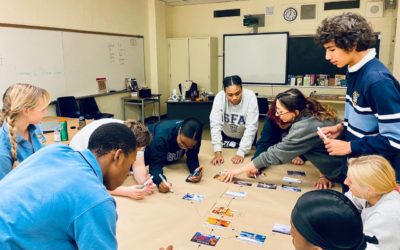Tech for Good Canada seeks to to educate all on digital technology’s impact on society. We see our role as essential for citizens of all ages in Canada to acquire digital literacy, not so much in terms of using tech or coding, as is provided elsewhere, but in terms of decoding how tech is changing our lives.
Digital tools impact our education systems, our consumption patterns, our physical and mental health, our democracies, our national and personal security, to name a few. Some call this “digital citizenship”, others “critical digital literacy”. We do this by connecting informed citizens and experts in regular, monthly discussions we call Citizen Salons.
Attendees are invited to watch a movie and/or read background material before the event. The discussion is moderated by Caroline Isautier, initially with Tim Grant (for the English salons), while the audience is encouraged to ask their own questions to the experts, who are free to respond as they wish. This makes for open, lively exchanges.

The main themes of our discussions are: access to information and censorship, online transactions and commerce, digital identity and privacy management, protection of our data and cybersecurity, online ethics and etiquette, and reliance on digital media.
The goal is to develop a critical discourse on digital technology that balances the blissful “techno progressivism” pushed by American tech giants and raises awareness of the dangers of a development where ethical values and civil rights such as privacy rights, are flouted.
Citizen Salons are in English or French, via video or in person. A writen account of the discussion is always available, along with a video replay of the entire discussion, as well as short video clips. They are free and open to all. In the past, as few as 20 (on person) and as many as 80 individuals (online) have regrouped.
Digital Citizen Salons since 2020 and their Accounts (often with video excerpts):
February 2020: ‘ Is Facebook deciding Elections ? ’ (English)
> Invitation email to ‘Is Facebook Deciding Elections’ with background material
March 2020: ‘ Teens and Social Media ‘ (English)
> Invitation email to ‘Teens and Social Media’ with background material
> Recap post on teens and social media
June 2020: The New Normal in Higher Education (English)
> Presentation of The New Normal in Higher Education Teaching
> Recap post on The New Normal in Higher Education Teaching
> YouTube 6 minute excerpt on Distance Learning in Higher Education
June 2020: K-12 Schools & Distance Learning (English)
> Recap post on Schools and Distance Learning in Canada during Covid19
> YouTube 1 to 12 minute excerpts on Implementing Remote Teaching in Secondary Schools in Canada
October 2020 : Social Networks and Video Games, Addictive by Design ? (French)
> YouTube 1 to 20 minute: Cyberdépendance: Addiction aux Jeux Vidéo et Réseaux Sociaux
January 2021 : Does Tech have to Mean Surveillance by Design ? (English)
> Recap : The Why and How of Privacy-By-Design in Tech
> YouTube 1 to 10 minute excerpts from the event: Privacy by Design in Tech
May 2021 : Tech in Education, Friend or Foe? (French)
> Recap: Numérique à l’école, allié ou ennemi ?
> YouTube 17 minute recap of Numérique à l’école, allié ou ennemi ?
January 2022 : Tech in Education, Friend or Foe: After a Two-Year Pandemic ? (French)







